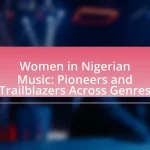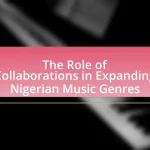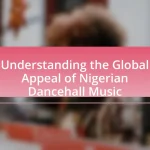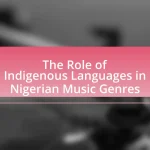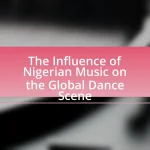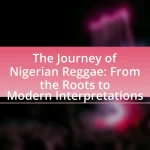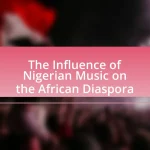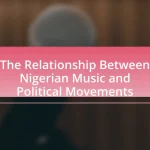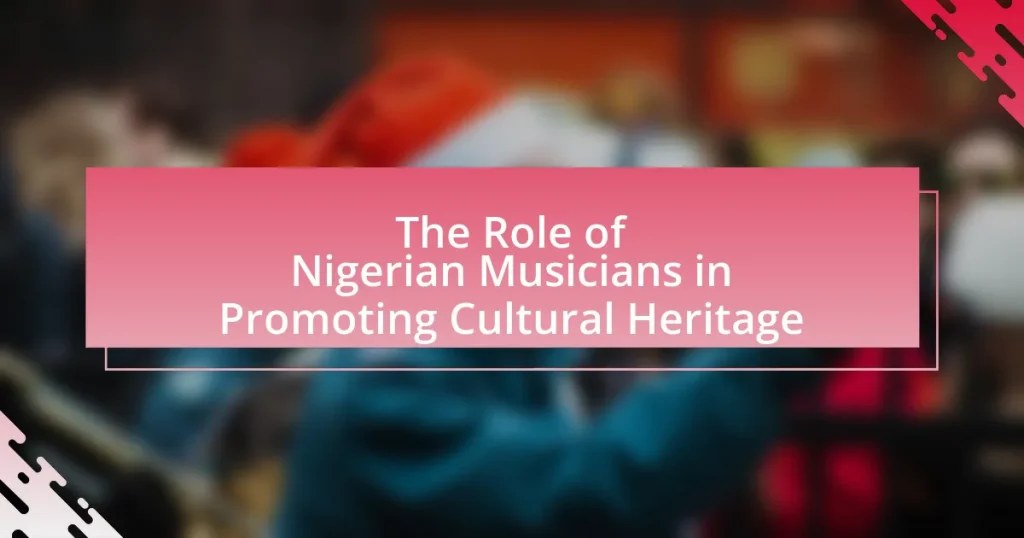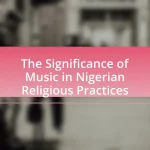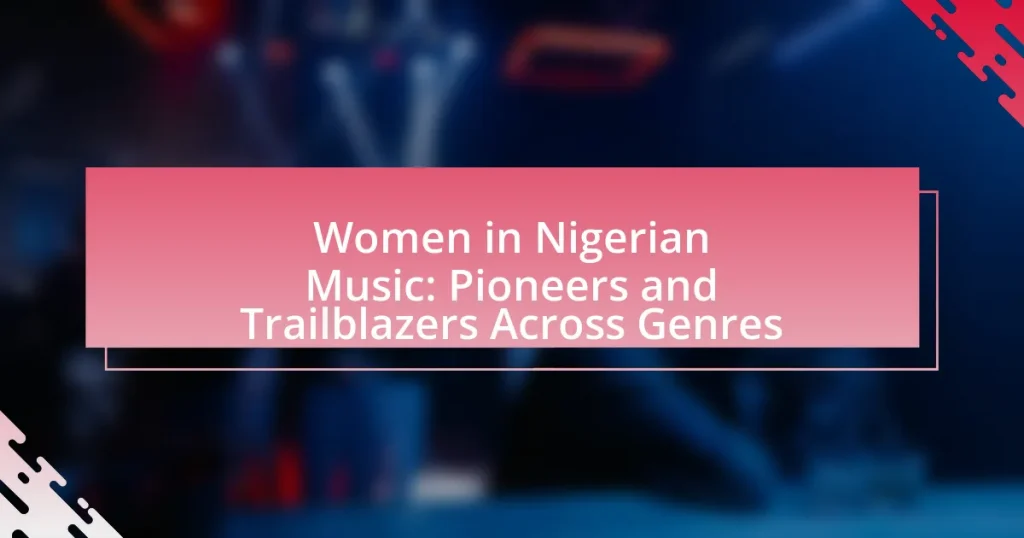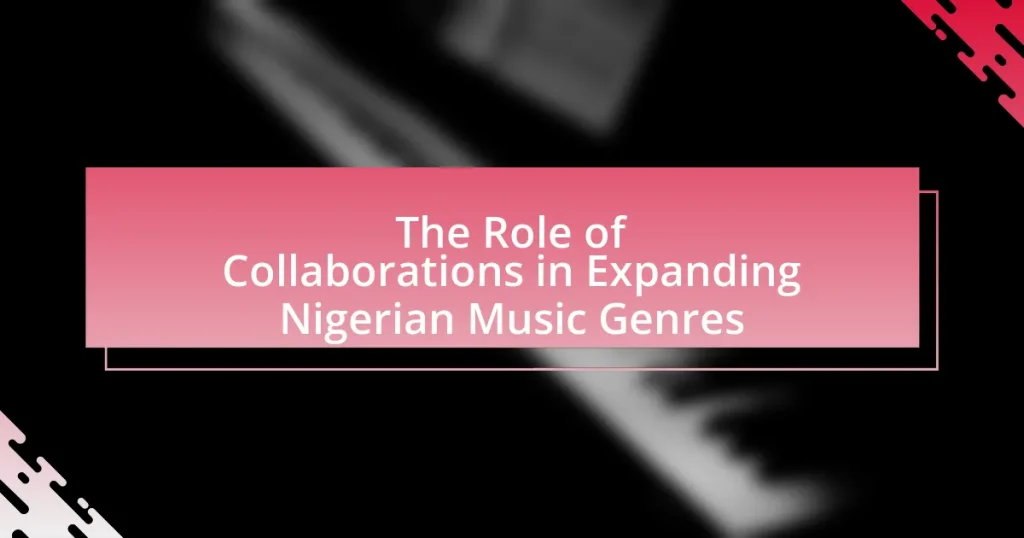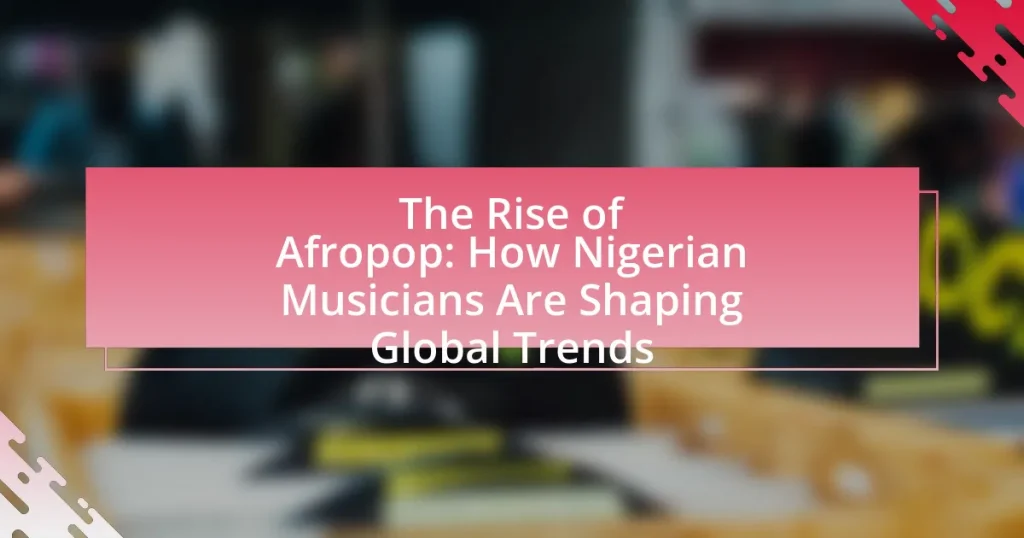Nigerian musicians play a vital role in promoting and preserving the country’s cultural heritage through their music, which incorporates traditional sounds, languages, and themes. Genres such as Afrobeat and Highlife reflect Nigeria’s diverse ethnic backgrounds and address social issues, fostering a sense of national identity. Musicians contribute to cultural education by using indigenous languages and storytelling techniques, while collaborations with cultural institutions enhance the visibility of traditional music. Despite challenges like limited funding and global competition, these artists continue to engage younger generations and leverage technology to promote their cultural heritage effectively.
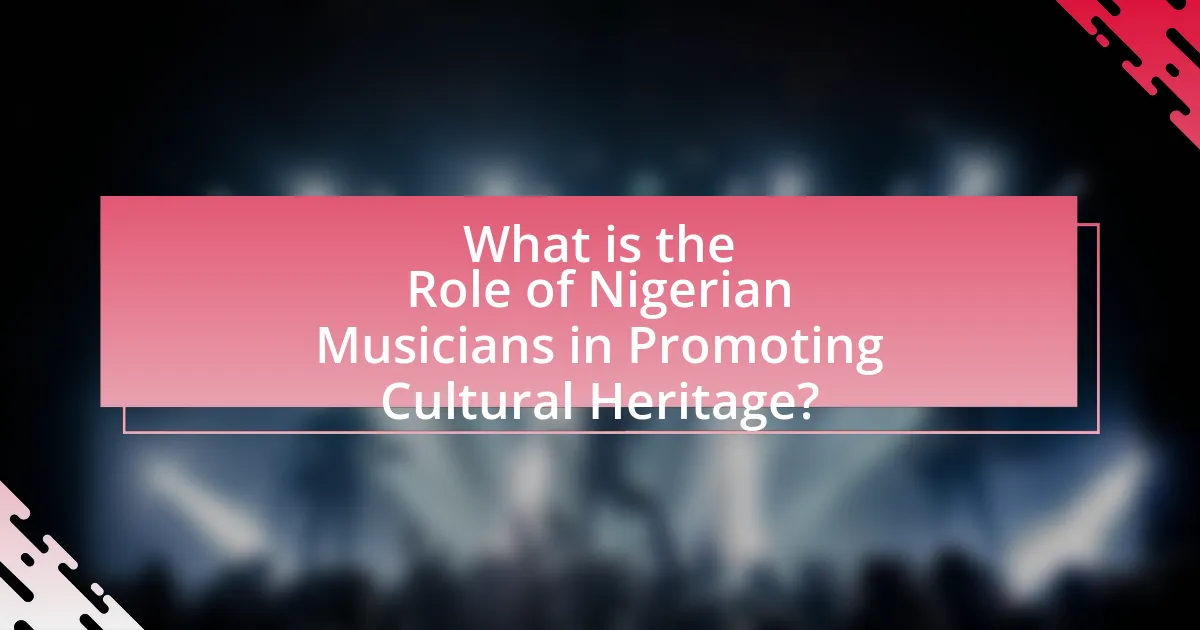
What is the Role of Nigerian Musicians in Promoting Cultural Heritage?
Nigerian musicians play a crucial role in promoting cultural heritage by incorporating traditional sounds, languages, and themes into their music. This integration helps preserve and disseminate cultural narratives, as seen in genres like Afrobeat and Highlife, which blend indigenous rhythms with contemporary styles. For instance, artists such as Fela Kuti and Burna Boy have utilized their platforms to highlight social issues and celebrate Nigerian history, thereby fostering a sense of national identity. Additionally, music festivals and cultural events featuring these musicians serve as venues for showcasing traditional art forms, further solidifying their impact on cultural heritage preservation.
How do Nigerian musicians contribute to the preservation of cultural traditions?
Nigerian musicians contribute to the preservation of cultural traditions by incorporating indigenous languages, traditional instruments, and folklore into their music. This practice not only keeps these elements alive but also educates younger generations about their cultural heritage. For instance, artists like Fela Kuti and Burna Boy have utilized traditional African rhythms and themes in their songs, which reflect historical narratives and societal issues. Additionally, music festivals in Nigeria often celebrate traditional music genres, such as Highlife and Juju, further promoting cultural awareness and appreciation among diverse audiences.
What specific cultural elements do Nigerian musicians highlight in their work?
Nigerian musicians highlight various cultural elements such as traditional rhythms, indigenous languages, folklore, and social issues in their work. These elements serve to preserve and promote Nigeria’s rich cultural heritage. For instance, genres like Afrobeat and Highlife incorporate traditional instruments and rhythms, reflecting the diverse ethnic backgrounds of Nigeria, including Yoruba, Igbo, and Hausa influences. Additionally, many musicians use indigenous languages in their lyrics, which fosters a sense of identity and connection to cultural roots. Furthermore, storytelling through music often addresses social issues, such as corruption and inequality, thereby engaging listeners in cultural discourse. This multifaceted approach not only entertains but also educates audiences about Nigeria’s cultural landscape.
How do musical genres reflect Nigeria’s diverse cultural heritage?
Musical genres in Nigeria reflect the country’s diverse cultural heritage by incorporating various ethnic traditions, languages, and historical influences. For instance, genres like Afrobeat blend traditional African rhythms with jazz and funk, showcasing the fusion of indigenous and Western musical elements. Highlife music, originating from the Igbo and Akan peoples, emphasizes the use of local instruments and melodies, highlighting regional cultural practices. Additionally, genres such as Juju and Fuji music draw from Yoruba traditions, incorporating storytelling and communal values, which are central to Nigerian culture. The existence of over 250 ethnic groups in Nigeria contributes to this rich tapestry, as each group brings its unique sounds and narratives into the musical landscape, thus preserving and promoting cultural identity through music.
Why is the role of Nigerian musicians significant in cultural education?
Nigerian musicians play a significant role in cultural education by preserving and promoting the country’s diverse cultural heritage through their music. They utilize traditional rhythms, instruments, and storytelling techniques to convey historical narratives, social values, and cultural practices, thereby educating audiences about their roots. For instance, genres like Afrobeat and Highlife incorporate elements of Nigerian folklore and history, making them vital tools for cultural transmission. Additionally, musicians often address contemporary social issues in their lyrics, fostering awareness and dialogue within communities. This dual function of entertainment and education underscores the importance of Nigerian musicians in shaping cultural identity and continuity.
How do musicians educate audiences about Nigerian history and traditions?
Musicians educate audiences about Nigerian history and traditions primarily through their lyrics, performances, and the incorporation of traditional instruments and styles. For instance, artists like Fela Kuti used Afrobeat to address social issues and historical narratives, reflecting Nigeria’s political struggles and cultural identity. Additionally, musicians often draw on folklore and proverbs in their songs, which serve as a medium to convey historical events and cultural values, thereby preserving and promoting Nigerian heritage. This approach not only entertains but also informs listeners about their roots and the significance of their traditions.
What impact does music have on cultural identity among Nigerians?
Music significantly shapes cultural identity among Nigerians by serving as a medium for expressing and preserving traditional values, languages, and social norms. Various genres, such as Afrobeat, Highlife, and Juju, reflect the diverse ethnic backgrounds and histories of Nigeria’s population, fostering a sense of belonging and community. For instance, the use of indigenous languages in lyrics promotes linguistic heritage and cultural pride, while traditional instruments and rhythms connect contemporary Nigerians to their ancestral roots. Research indicates that music festivals and performances often celebrate local customs, reinforcing cultural identity and unity among different ethnic groups.
In what ways do Nigerian musicians collaborate with cultural institutions?
Nigerian musicians collaborate with cultural institutions primarily through partnerships for cultural festivals, educational programs, and preservation initiatives. These collaborations often involve musicians performing at events organized by cultural institutions, such as the National Museum or local arts councils, to promote traditional music and dance. For instance, the annual Lagos Carnival features performances by various artists, showcasing Nigeria’s diverse cultural heritage. Additionally, musicians engage in workshops and seminars hosted by cultural institutions to educate younger generations about traditional music forms, thereby fostering cultural continuity. Such collaborations not only enhance the visibility of cultural heritage but also provide musicians with platforms to reach wider audiences, reinforcing the importance of cultural preservation in Nigeria.
What types of partnerships exist between musicians and cultural organizations?
Musicians and cultural organizations engage in various types of partnerships, including collaborative projects, sponsorships, and educational initiatives. Collaborative projects often involve musicians working with cultural organizations to create performances or festivals that celebrate cultural heritage, such as the annual Lagos Carnival, which showcases traditional music and dance. Sponsorships typically see cultural organizations funding musicians’ events or albums, thereby promoting cultural events while providing financial support. Educational initiatives may include workshops or mentorship programs where musicians share their skills and knowledge with the community, fostering cultural appreciation and preservation. These partnerships enhance cultural visibility and contribute to the sustainability of cultural practices.
How do these collaborations enhance cultural heritage promotion?
Collaborations among Nigerian musicians enhance cultural heritage promotion by creating a fusion of diverse musical styles that reflect the country’s rich traditions. These partnerships often result in innovative works that incorporate indigenous instruments, languages, and storytelling techniques, thereby preserving and revitalizing cultural practices. For instance, collaborations between traditional and contemporary artists can introduce younger audiences to historical narratives and cultural values embedded in music, fostering a deeper appreciation for their heritage. Additionally, such collaborations can reach broader audiences through various platforms, amplifying the visibility of Nigerian culture on global stages, as evidenced by the international success of projects like “One Africa Music Fest,” which showcases a blend of traditional and modern African music.
What challenges do Nigerian musicians face in promoting cultural heritage?
Nigerian musicians face several challenges in promoting cultural heritage, primarily including limited access to funding, inadequate infrastructure, and competition from global music trends. Limited funding restricts their ability to produce high-quality music and engage in extensive promotional activities. Inadequate infrastructure, such as poor recording facilities and lack of support from the government, hampers their efforts to reach wider audiences. Additionally, the overwhelming influence of global music genres, particularly Western pop, often overshadows traditional Nigerian music, making it difficult for local artists to gain recognition and appreciation for their cultural contributions. These factors collectively hinder the effective promotion of Nigeria’s rich cultural heritage through music.
How do economic factors affect musicians’ ability to promote culture?
Economic factors significantly impact musicians’ ability to promote culture by influencing their financial resources, access to platforms, and overall market viability. For instance, limited funding can restrict musicians from producing high-quality recordings or organizing cultural events, which are essential for cultural promotion. Additionally, economic instability can lead to reduced audience spending on cultural experiences, further diminishing musicians’ income and their capacity to invest in cultural initiatives. According to a report by the World Bank, countries with stronger economic conditions tend to have more vibrant cultural sectors, as musicians can leverage better infrastructure and support systems to reach wider audiences. This correlation highlights how economic health directly affects the cultural contributions of musicians, particularly in Nigeria, where economic challenges can hinder the promotion of rich cultural heritage.
What role does globalization play in the preservation of Nigerian cultural heritage?
Globalization plays a significant role in the preservation of Nigerian cultural heritage by facilitating the exchange of cultural practices and ideas across borders. This exchange allows Nigerian musicians to reach global audiences, thereby promoting traditional music and art forms that might otherwise be marginalized. For instance, the rise of platforms like YouTube and Spotify enables artists such as Burna Boy and Wizkid to showcase indigenous sounds, blending them with contemporary genres, which helps to sustain and revitalize interest in Nigerian cultural expressions. Additionally, international collaborations often lead to the fusion of traditional and modern elements, ensuring that cultural heritage remains relevant in a globalized context.
How can Nigerian musicians effectively engage younger generations in cultural heritage?
Nigerian musicians can effectively engage younger generations in cultural heritage by incorporating traditional sounds and themes into contemporary music genres. This approach not only preserves cultural elements but also makes them relatable to younger audiences. For instance, artists like Burna Boy and Wizkid have successfully blended Afrobeat with modern pop and hip-hop, showcasing traditional rhythms and instruments while addressing contemporary issues. This fusion attracts younger listeners who may not be familiar with traditional music, thereby fostering an appreciation for their cultural roots. Additionally, collaborations with local artisans and storytellers can further enhance the authenticity of the cultural representation in their music, creating a deeper connection with the heritage being celebrated.
What strategies can musicians use to make cultural heritage appealing to youth?
Musicians can make cultural heritage appealing to youth by integrating traditional elements into contemporary music styles. This strategy allows for the preservation of cultural identity while engaging younger audiences who are more inclined towards modern genres. For instance, Nigerian musicians like Burna Boy and Wizkid have successfully blended Afrobeat with hip-hop and R&B, attracting a global youth audience while showcasing traditional rhythms and instruments. Research indicates that such fusion not only revitalizes interest in cultural heritage but also fosters a sense of pride among young people, as seen in the increased popularity of traditional music festivals in Nigeria, which have reported attendance growth of over 30% in recent years.
How can technology be leveraged to promote cultural heritage through music?
Technology can be leveraged to promote cultural heritage through music by utilizing digital platforms for distribution, preservation, and education. Digital streaming services like Spotify and Apple Music allow Nigerian musicians to reach global audiences, showcasing traditional sounds and contemporary interpretations of cultural music. Additionally, social media platforms enable artists to share stories and context behind their music, fostering a deeper understanding of cultural significance. Furthermore, technology facilitates the creation of virtual reality experiences and interactive apps that immerse users in cultural music traditions, enhancing engagement and appreciation. For instance, the use of mobile applications to teach traditional instruments or music theory can help preserve these practices for future generations.
What are the best practices for Nigerian musicians in promoting cultural heritage?
Nigerian musicians can effectively promote cultural heritage by incorporating traditional instruments, languages, and themes into their music. By using instruments such as the talking drum or shekere, musicians create authentic sounds that resonate with cultural significance. Additionally, singing in indigenous languages like Yoruba, Igbo, or Hausa not only preserves these languages but also connects with local audiences on a deeper level.
Furthermore, musicians can draw inspiration from folklore, proverbs, and historical narratives, which serve to educate listeners about their cultural roots. For instance, artists like Fela Kuti and Burna Boy have successfully integrated social and political themes reflective of Nigerian history into their music, thereby fostering a sense of identity and pride among listeners.
Collaborating with cultural institutions and participating in festivals dedicated to Nigerian heritage can also amplify their efforts. Events like the Lagos Carnival or the Calabar Festival showcase traditional music and dance, providing a platform for musicians to reach wider audiences while celebrating their cultural heritage.
These practices not only enhance the visibility of Nigerian culture but also contribute to its preservation for future generations.
How can musicians balance modern influences with traditional elements?
Musicians can balance modern influences with traditional elements by integrating contemporary styles while preserving the core aspects of their cultural heritage. For instance, Nigerian musicians often blend Afrobeat rhythms with modern genres like hip-hop or electronic music, creating a fusion that appeals to diverse audiences while maintaining traditional instrumentation and themes. This approach not only showcases the richness of their cultural background but also allows for innovation and relevance in today’s music scene. The success of artists like Burna Boy, who incorporates traditional Yoruba music with global sounds, exemplifies this balance, demonstrating that cultural heritage can coexist with modernity effectively.
What resources are available for musicians to enhance their cultural promotion efforts?
Musicians can enhance their cultural promotion efforts through various resources, including social media platforms, music festivals, cultural grants, and collaborations with cultural organizations. Social media platforms like Instagram and Facebook allow musicians to reach a global audience, showcasing their cultural heritage through music and storytelling. Music festivals, such as the Lagos Jazz Series, provide opportunities for live performances that celebrate cultural diversity. Cultural grants from organizations like the National Endowment for the Arts support projects that promote cultural heritage. Collaborations with cultural organizations, such as the Nigerian Tourism Development Corporation, can further amplify their reach and impact. These resources collectively empower musicians to effectively promote and preserve their cultural heritage.
